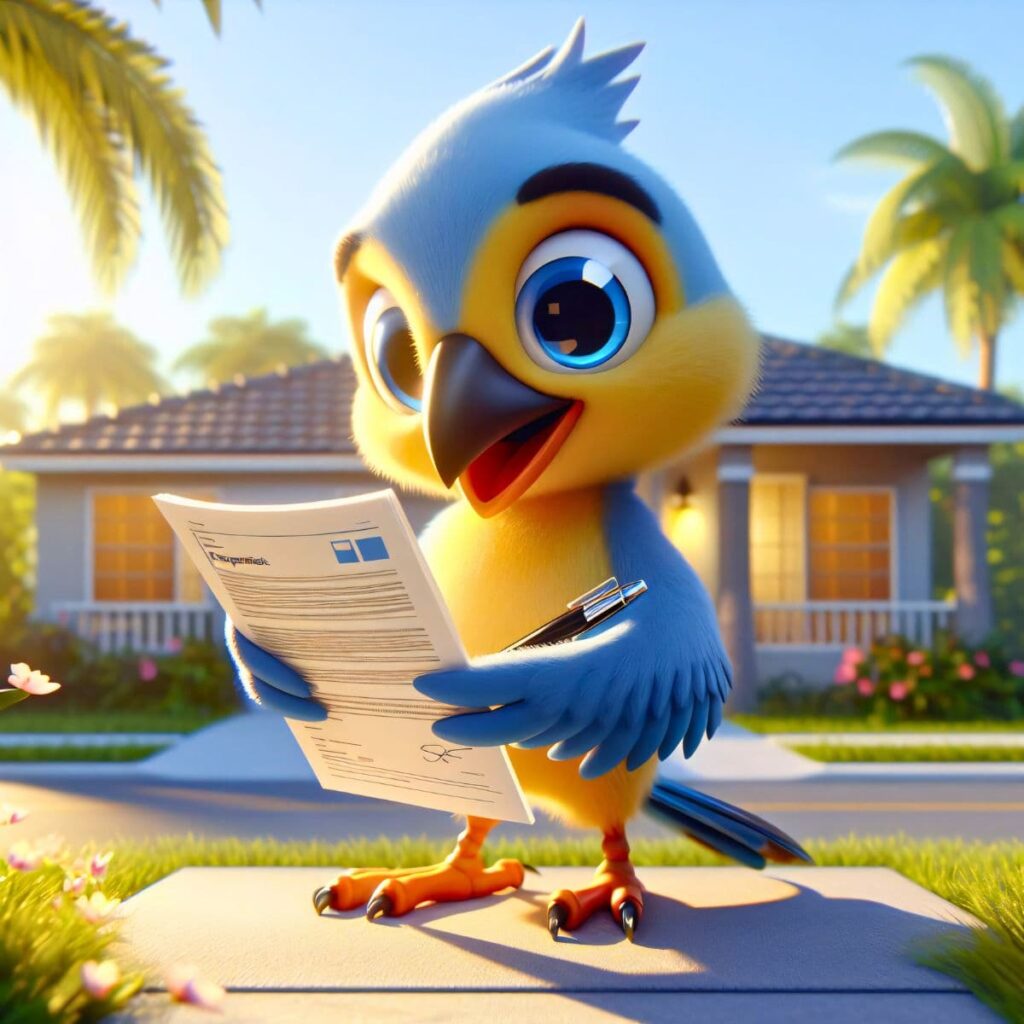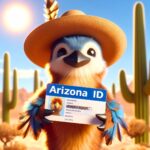So, you’ve decided to spend the colder months down basking in the Florida sunshine. Now you’re sitting there on your pool chair wondering about Florida residency requirements for snowbirds.
Do you have to become a resident? How long can you stay before you should? What even makes you a resident?
If you’re a snowbird who’s fallen in love with Florida and its sunny beaches, then step right up. I’ll cover everything you need to know about Florida residency requirements for snowbirds right here.

How Long Can You Live in Florida Before Becoming a Resident?
Like several other states, you can live in Florida for 183 days, or six months, before you become a resident. Under that, and it’s totally find to consider yourself a seasonal visitor, like a snowbird!
You also do not have to become a resident to own a second home in Florida, or even to register your car in Florida as a snowbird!
Steps to Become a Resident of Florida
If you do plan to stay the 183 days and become a sunbird instead of a snowbird, don’t worry! I’ve got all the details on the steps to become a Florida resident.
Importance of Time Spent in Florida
As I mentioned before just owning property in Florida doesn’t automatically grant you residency status. An aspect of establishing your primary residence here revolves around how much time you spend in the state.
Important documents like your bank statements, bills, and licenses should reflect your Florida address. Plus, it solidifies your case if you intend to make Florida your main home. You’ll also need it for things like your Driver’s License, but more on that later.
Filing a declaration of domicile isn’t required, but it helps to add some “good faith” to your intent to become a resident. You do this at your local county clerk’s office.
In short: the more your life in Florida reflects your permanent residency there, the better. It’s all about showing them you’re here to stay!
Obtain a Florida Driver’s License
There’s a good reason for your Florida Driver’s License. Getting a local license keeps you driving without a messy break, but it also helps establish residency.
Plus, you’ll need the license to vote or apply for other state amenities and services!
It’s also important to note that you have 30 days from establishing your residency to get your Florida license, per the laws. Here’s what you’ll need:
- Original birth certificate, US Passport, or US Passport card
- Proof of Social Security (a Social Security card, W-2, or paycheck stub are examples)
- Two documents showing proof of Florida address (a mortgage or lease, utility bills, insurance policies, or similar official documents)
Canadians may also apply for a Florida Driver’s License, but should use their Canadian passport or birth certificate instead of the US one. The rest of the requirements remain the same.
Tip: your name needs to match on all your documents. If you’ve had a name change, make sure to square that away with the Social Security office first before you visit the DMV.
Then, just head into any Florida DMV branch that offers licensing services. Sorry, no online since you’ll have to get your photo taken and likely pass an eye exam as well. If you have a valid license from another state, you should be able to skip the road test.
The fee is $48 for a license, but note that this is subject to change at any time. Hand everything over and walk away with your shiny new Florida license!
How to Register and Insure Your Vehicles in Florida
If you’ve got a vehicle, you’re going to want to make sure that it’s both registered and insured in Florida as part of declaring your residency there.
Now, you may have already done this if you had a vehicle you were leaving in Florida for use while snowbirding. If you haven’t, though, well may as well knock it out a the same time as your Driver’s License, since you need many of the same things:
- Valid driver’s license (use that new Florida one)!
- Proof of Florida insurance for the vehicle (must have it before you can register the car or truck)
- The title to the car (or the former registration if you’re from a state where the lienholder keeps it)
- Proof of Florida residency (mortgage, lease, or utility documents as noted above)
- VIN verification (which can be done at the DMV if you bring the car)
Then you’ll head to the DMV, same as for your license, pay the fees (watch out: it can be upwards of $400 for the initial registration), and voila! You’ll have your car registered in Florida, with some fancy new license plates too.
Voting in Florida
Okay, this one is easy peasy. If you plan on being a Florida resident, you want to make sure you are registered to vote in Florida. Signing up is part of establishing Florida residency, and it will make your declaration of domicile all the more convincing.
It’s also one of those civic duties that reflects your Florida commitment. As they say, put your money where your mouth is or, in this case, put your vote where your house is!
You can use the online Florida voter registration system to make things quick and simple. Just have a couple items handy when you sit down to complete the application:
- Your Florida Driver’s License or non-driver ID card
- The issuance date of your license or ID
- Last 4 digits of your social security number
That’s it! The application takes just 3 steps and less than 15 minutes to complete.
Selecting a Home for Rent or Purchase in Florida
As I’ve mentioned before, a key step in declaring residency in Florida is having a permanent address there. While it doesn’t matter if you own or rent, it is important how you select your Florida home.
If you’re moving to Florida and calling that your home base, you’ll want a residence that’s similar (or better) than the place you’re moving from. Of course, that’s not a hard and fast rule, as empty nesters often downsize when they move.
However, a tiny studio apartment in Florida doesn’t say, “I consider Florida my permanent home” if you had a large single family home before. You’re also going to need the space for your important items, since you should be moving them to the place you’re spending most of your time.
To you it may not be important, but the local tax auditors are sharp and will compare your Florida home size and the one you left behind. The last thing you want to deal with is being accused of tax evasion or something uncouth about your move, since Florida has no income tax.
Establishing Personal Connections in Florida
Another thing that’s not so hard on the wallet is hanging out more in Florida. Become a familiar face around the neighborhood and establish some personal connections! This will make you seem (and feel) more like a resident than a visitor.
Prove that you’re here for more than just the temps in the 70s. Make some friends, and show that you’re ready to put your roots down. Join local clubs, sport groups, and take out some local memberships or annual passes to say “I’m here to stay!”
Setting Up Banking Arrangements in Florida
Living the Florida life means opening a Florida bank account. You can use a national bank, of course, but it should be conveniently near your Florida home.
If you’ve hung up your work boots for good and are living off your Social Security checks or retirement plan distributions, ensure those are being mailed to Florida or deposited into a Florida bank.
Make sure other things tied to your home are in Florida too, like your mortgage company, utility companies, loans, or similar. This helps to get you rooted in the area.
Do Your Work in Florida
If you’re a hustler and thinking about moving to Florida, one good way to demonstrate your commitment is to start a business in Florida.
Moving an existing business? You may need to draft up a new business plan for the Florida market and consider your new environment. Uprooting and resettling a business could really disturb your business if it’s not done with careful planning!
Not an entrepreneur? No worries! You can also work for a Florida-run business to show your commitment to the area. Though, with remote work options this isn’t always something you’ll do. Plus, if you’re retired, you won’t be punching the clock anyway.
It might be a great opportunity to get involved in volunteering work or a part-time job for some extra cash, though.

Tips for Canadian Snowbirds
Tons of Canadian snowbirds pack up to spend the winters in the southern state. That’s cool, but they don’t want to get on the IRS’s radar. So how can you enjoy the US without having to pay taxes?
The first way is to fail the Substantial Presence Test. The IRS uses this test to see if you’ve been in the country long enough to qualify as a resident for tax purposes.
It means you can’t be in the US for more than 183 days in 3 years. The counting period for that is a bit tricky, though, so make sure to read up on specifics.
If you go over, you’ll likely need to file a U.S. Nonresident tax return (Form 1040NR). But, it can be complicated to navigate, and you’ll want to consult a tax professional for help.
Frequently Asked Questions
What Are the Florida Residency Requirements for Snowbirds?
Florida residency requirements for snowbirds entail establishing a physical presence in the state for a significant portion of the year, typically at least 183 days, to qualify as a resident for tax and legal purposes.
If you plan to stay less than that amount of time, even if you own a second home, you do not need to declare residency as a snowbird.
Can You Be a Resident of Two States?
While you can own more than one house, your home is your domicile, and where you spend most of your time. This also becomes your state of residence. If you spend over 183 days in another state, they may de facto deem you to be a resident there as well.
This gets tricky when suddenly both states want you to file tax returns, so it’s highly recommended to track your time spend and only stick to one stare for residency.
How Can Snowbirds Establish Residency in Florida?
Snowbirds can establish residency in Florida by providing evidence of their physical presence, such as utility bills, lease agreements, voter registration, Florida driver’s license or identification card, and other documents demonstrating ties to the state.
You’ll also want to spend the majority of your time here, or over 6 months per year, to declare residency.
Do Snowbirds Need to Obtain a Florida Driver’s License to Establish Residency?
Snowbirds are not required to obtain a Florida driver’s license to establish residency, but obtaining one can serve as additional evidence of residency and may be necessary for certain legal and administrative purposes.
If you do not drive, you qualify for a Florida identification card (a non-driver ID) instead.
Are There Financial Benefits to Establishing Residency in Florida for Snowbirds?
Yes, there are financial benefits to establishing residency in Florida for snowbirds, including no state income tax, favorable tax laws for retirees, and potential eligibility for homestead exemption on property taxes.
The homestead exemption requires owning and occupying a primary residence in the state as your permanent domicile.
Can Snowbirds Use a Mail Forwarding Service to Establish Residency in Florida?
While using a mail forwarding service may help snowbirds receive mail in Florida, it alone will not be sufficient to establish residency.
Snowbirds should supplement this with other evidence of physical presence in the state.
Wrapping Up
Florida residency requirements for snowbirds kick in when you’ve reached that six month mark of living there. Under that, and you’re perfectly fine to consider yourself a seasonal visitor.
When you’re ready to declare residency, well, the process and needs are the same as everyone else’s! The first step is securing a residence in Florida as your primary and permanent pad.
Then comes getting a car or getting a Florida license and insurance if you already have one. Putting your kids (if any) in a Florida school is also a good move, but an equally good one is moving your money to a Florida bank account.
Once you’re able to show your commitment to living in the Sunshine State and have actually lived within the border for over six months, you’ll be accepted as a resident in no time!
- Best Seafood Restaurants in Myrtle Beach South Carolina - July 17, 2024
- 20+ Fun Things to Do in Tempe Arizona: A Complete Guide - July 5, 2024
- Discover the Best Restaurants in Beaufort South Carolina - June 19, 2024




